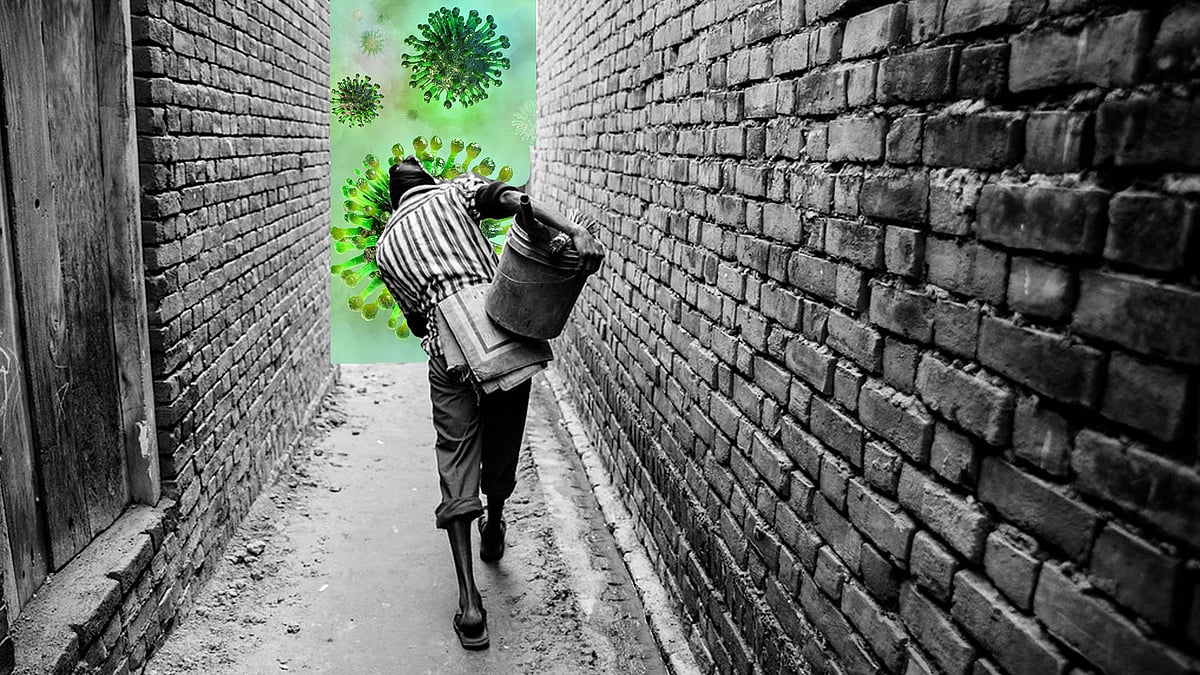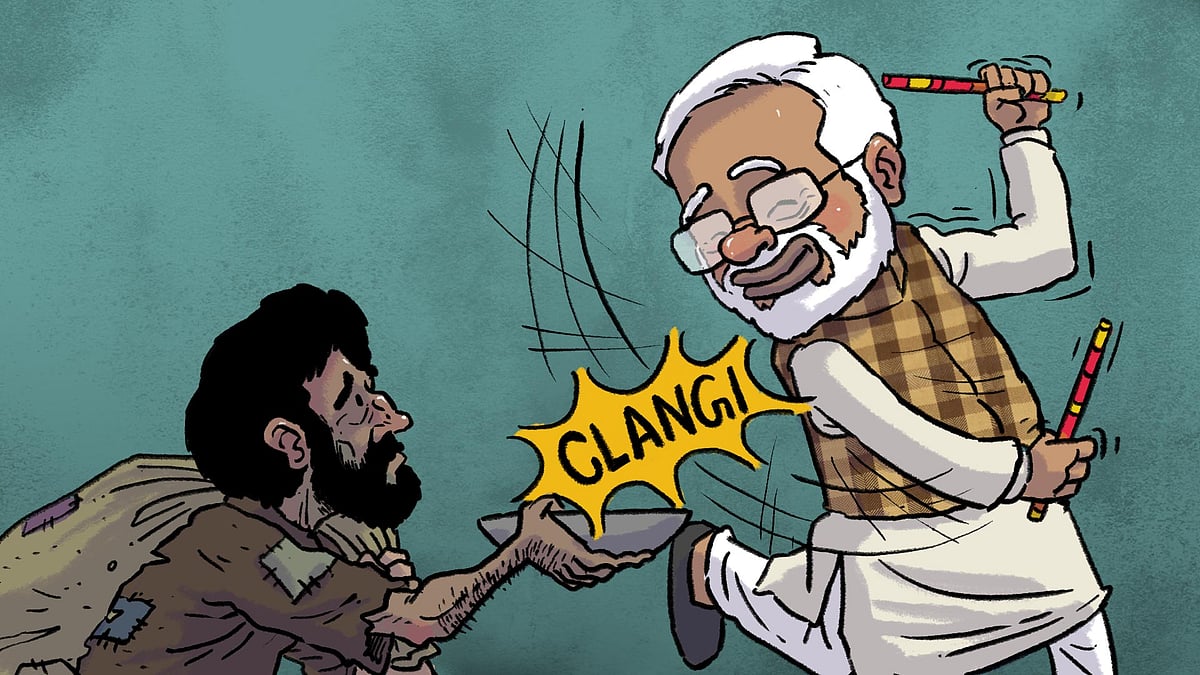Broke and desperate in Lal Kuan: Meet the migrant workers heading home
Many walked for days to reach this highway town in Uttar Pradesh, hoping to catch a bus home. Ahead lies a long journey, and uncertainty.
Buses, people and dust are everywhere at Lal Kuan, a nondescript highway town in Uttar Pradesh’s Ghaziabad. The people are mostly migrant workers who appear to be arriving from all directions: they crowd both sides of the elevated National Highway 34 and at every corner under it. They stream in from Panipat, Delhi, Noida, Ghaziabad, and are bound for towns and villages in Uttar Pradesh and Bihar. Families move together, carrying small bundles that often turn out to be children on a closer look.
A group of restless policemen – a dozen or so – stand beneath the flyover, assigning destinations to a fleet of interstate buses that will drop these workers home, or at least somewhere nearby. One policeman says the packed buses will go as far as Lucknow or Varanasi, but definitely not Bihar, where the state government has expressed hesitation at letting the migrants in. Private buses stand on the highway too, offering to take people as far as Gorakhpur. They are not free of cost as the state buses, charging as much as Rs 1,000 per passenger.
I inquire about the fares from a driver of Kanchan Travels who is headed for Hardoi. He will charge Rs 700, he replies. Isn’t that too much? “These workers earn their living in Delhi,” he smirks. “How can they not shell out a few hundred rupees?”
Shops in and around Lal Kuan are also selling at inflated rates: a bottle of water priced at Rs 20 for Rs 25, a Rs 10 packet of chips for Rs 15. “We had to venture out to get things amidst the lockdown, so we have increased the rates,” one shopkeeper says by way of an explanation.



Manish, 22, who has reached Lal Kuan after a 26-hour walk from Panipat, Haryana, says he thought the buses would all be free. “I want to go to Kanpur but I haven’t found a bus yet. One of the buses I did find was asking for Rs 600. I only have Rs 300 left since I spent money on food and water,” he adds.
Saurabh Kumar, who works in Gurgaon, too did not see this coming. “I was in Anand Vihar last night. They picked me up this morning and dropped me midway to Lal Kuan,” he recounts. “I had to walk the remaining distance. I’m going to Hardoi but don’t have the money to pay for these buses.”

Anand Vihar in Delhi was barricaded on March 29 following a significant influx of migrant workers the previous day. Many of them were brought to Lal Kuan, 20 km away, in buses. The rest walked.
One of those is Rahish, 45, who walked from Govindpuri in South Delhi to Anand Vihar, 20 km away. He is headed to Shravasti in Uttar Pradesh, over 700 km away. He tells Newslaundry that policemen at Anand Vihar beat him and did not let him enter the bus station. Rahish, who has a leg wound, reached Lal Kuan on foot an hour past noon. “I work at a sewing shop and earn Rs 400 everyday. I lived inside the shop, but the owner has closed it. I didn’t have anything to eat so I’m leaving for home,” he says, adding that he expected relief from the Delhi government but did not get any.
Rahish ate at Lal Kuan, where various NGOs had landed to make water and food available to the workers. His goal is to take a bus to Lucknow. The latter part of the journey to Shravasti, another 170 km, is a secondary concern for now. When I ask him what he makes of the pandemic, Rahish’s response is no different than that of fellow migrant workers: the virus won’t kill him, starvation likely will.
As we speak, a bus to Lucknow arrives. Rahish stands, straps on a heavy bag, and limps to the bus. “Lucknow! Lucknow! 728 rupees,” the conductor shouts.
At Lal Kuan, the police are determined to end the affair before sunset. They are losing patience by the hour, and social distancing norms have been only maintained between the policemen and the workers. A whole mass of humanity throngs around buses, pushing and brushing past each with better-than-nothing masks. But as soon as a few come near the policemen, they are shooed away with truncheons.
When a group of young men approach a policeman inside a car, the officer does not roll down his window; he opens the gate a few inches and makes the men stand behind it.
The men are Mitlesh, 24, and Chandan, 25. Their destination is the town of Sasaram in Bihar, but the policeman tells them that none of the buses are going that far. The two are dailywage workers, earning about Rs 350 a day for working at a flyover construction site in Ghaziabad. “Our contractor switched off his phone. We did not get our monthly wage this month so we don’t have any savings. We had Rs 700 for ration but that is over now,” Mitlesh tells Newslaundry.
I ask Chandan what he plans to do now. “We’ll die now, what else will we do?” he exclaims, frustrated.


With every police announcement about a bus’s destination, hundreds pounce on the vehicle to secure a space. Many climb onto the roof. Vehicles that seem empty are routinely asked to stop by the police officials. A few constables then walk up to the conductor and there is some shouting. People are then signalled to huddle in and they duly comply.
As the sunset nears, the policemen scowl. They charge at the workers sitting on the road or the footpath, and even scold journalists. Most of the workers are expecting buses to drop them in their towns but the police operate with a different assumption: they want people to reach as far as they can in Uttar Pradesh and then chalk out their own fates. Many chose to sit because they are tired after hours, even days, of walking. But all it takes to disrupt this torpor is a paunchy constable with a waving stick.

These stories replicate in all conversations with the migrant workers. Most of them earn around Rs 10,000 a month. They are paid half of this money on a weekly basis, for subsistence. The rest comes at the end of the month. But with the pandemic breaking out and the informal economy coming to a halt, the monthly wages haven’t come.
Phoolchand, 31, is headed to Mahoba in UP with his wife and four children. He sent two of his other children home only a couple of days ago. Both husband and wife work at construction sites in Ghaziabad. They came to NCR just two months ago after work had dried up in Mahoba. “We have a room but the owner is not ready to exempt the rent. We cannot manage the food as well,” Phoolchand says. “The company owner hasn’t paid our contractor and so he hasn’t paid us. What can we do?”

Nothing in Lal Kuan has a semblance of planning or coordination. It is the authority enjoyed by the policemen that enforces their quick and often arbitrary decisions. Migrants continue to pour in till 6 pm, as the police hurry to pack away as many of them as they can. Things are chaotic, and often get ugly. Since this is being done to put in place a lockdown to contain the coronavirus pandemic, the possibility of a single infected individual seems scary. Many are going home expecting better and safer times in this historic lockdown. One hopes that’s indeed the case.
 Coronavirus, social distancing, and the return of caste apologists
Coronavirus, social distancing, and the return of caste apologists Why India doesn’t seem to care about its poor even during a pandemic
Why India doesn’t seem to care about its poor even during a pandemic